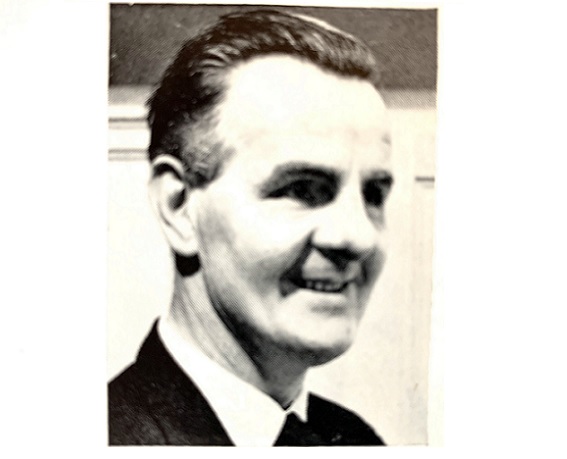
Brass band historian Tim Mutum has been asked by 4BR to curate a ‘Hall of Fame’ of players, conductors, composers, adjudicators, entrepreneurs, administrators and personalities who have helped to shape as well as drive the brass band movement from its beginning to the modern day.
Fame can be lasting and indelible or fleeting and ephemeral – from the names who appear on contest record rolls of honour to those who made contributions to greatness in other ways around the brass band globe.
Fame can be lasting and indelible or fleeting and ephemeral – from the names who appear on contest record rolls of honour to those who made contributions to greatness in other ways around the brass band globe.
The undisputed giants of Gladney, Rimmer and Mortimer will of course be included, but so too those who may not so readily be spoken of as ‘greats’ but whose contribution should without doubt be marked.
We hope you enjoy the series, which we also hope will be added to with further information about each person as we develop it.
No 9: Norman Ashcroft (1919 - 2009)
Norman Ashcroft was a player’s player.
Very much a product of his working class upbringing in Hebburn in South Tyneside, he was an outstanding musician who excelled on both trumpet and cornet – one also imbued with the talent to cross musical genres with understated ease.
Modest and self-effacing, his work ethic (with the exception of one lesson he was self-taught) and professionalism gained huge admiration from his peers, yet for the most part he was content to shy away from the spotlight.
A remarkable man
For almost 20 years he was the principal cornet of the Fairey Band, yet his legacy is not to be found in a plethora of solo recordings: It came from the lasting respect gained from those he performed with.
On his death aged 90 on the 6th July 2009, his great friend Dr Ronnie Kershaw wrote: “He was a quite remarkable man.”
Indeed he was.
Almost totally deaf in his right ear from an early age, Norman Ashcroft overcame any perceived diminished ability with a determination that famously once saw him practice at home in front of a roaring coal fire so that he could replicate any discomfort he would encounter on the concert or contest stage.
He started playing on tenor horn, moving onto flugel before joining Harton Colliery Band on principal cornet at the age of 19.
Almost totally deaf in his right ear from an early age, Norman Ashcroft overcame any perceived diminished ability with a determination that famously once saw him practice at home in front of a roaring coal fire so that he could replicate any discomfort he would encounter on the concert or contest stage.
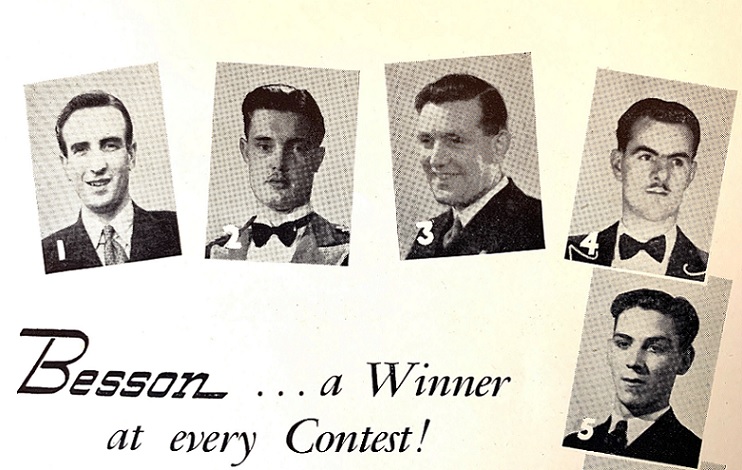
In good company: Ashcroft (4) next to Teddy Gray, Derek Garside, Alan Collins and E. Coombs in 1954
Hallmark
Norman soon gained a reputation as a fine ‘top-man’ - his playing hewn from a thick seam of solid, consistent technique and a natural, intuitive musicality that was to become an indelible hallmark throughout his career.
Harton was arguably the finest band in the North of England following the decline of St Hilda’s Colliery Band, and produced numerous outstanding players - including the legendary cornet figures of Jack Mackintosh and later Maurice Murphy (who he taught and played with).
He performed with Harton at the Crystal Palace in 1938 and again when the Nationals returned to the Albert Hall in 1946, as well as four times at the British Open between 1941 and 1944, all under the baton of Jack Atherton.
Like Mackintosh and Murphy he also gained invaluable experience performing with local orchestral groups and Bach Societies, and was always in demand as a soloist during the annual oratorio seasons.
After one performance of ‘The Trumpet Shall Sound’ from ‘Messiah’ at Newcastle Town Hall, the celebrated bass soloist Owen Brannigan made the point of congratulating him.
Like Mackintosh and Murphy he also gained invaluable experience performing with local orchestral groups and Bach Societies, and was always in demand as a soloist during the annual oratorio seasons.
Turned down
Not surprisingly the foremost works bands of the era came after him. Norman was offered the principal cornet position at the then Fairey Aviation Works Band, but politely turned it down, preferring to stay in his home area than that of Manchester.
Instead, in 1947 he joined the Carla Rosa Opera Company working under conductors such as Vilem Tausky and went on to play with every major orchestra including the Halle under Sir Malcolm Sargent.
In 1950, Fairey finally got their man (after Harry Mortimer persuaded him of both job security and musical interest). He was to remain as principal cornet for the next 18 years.
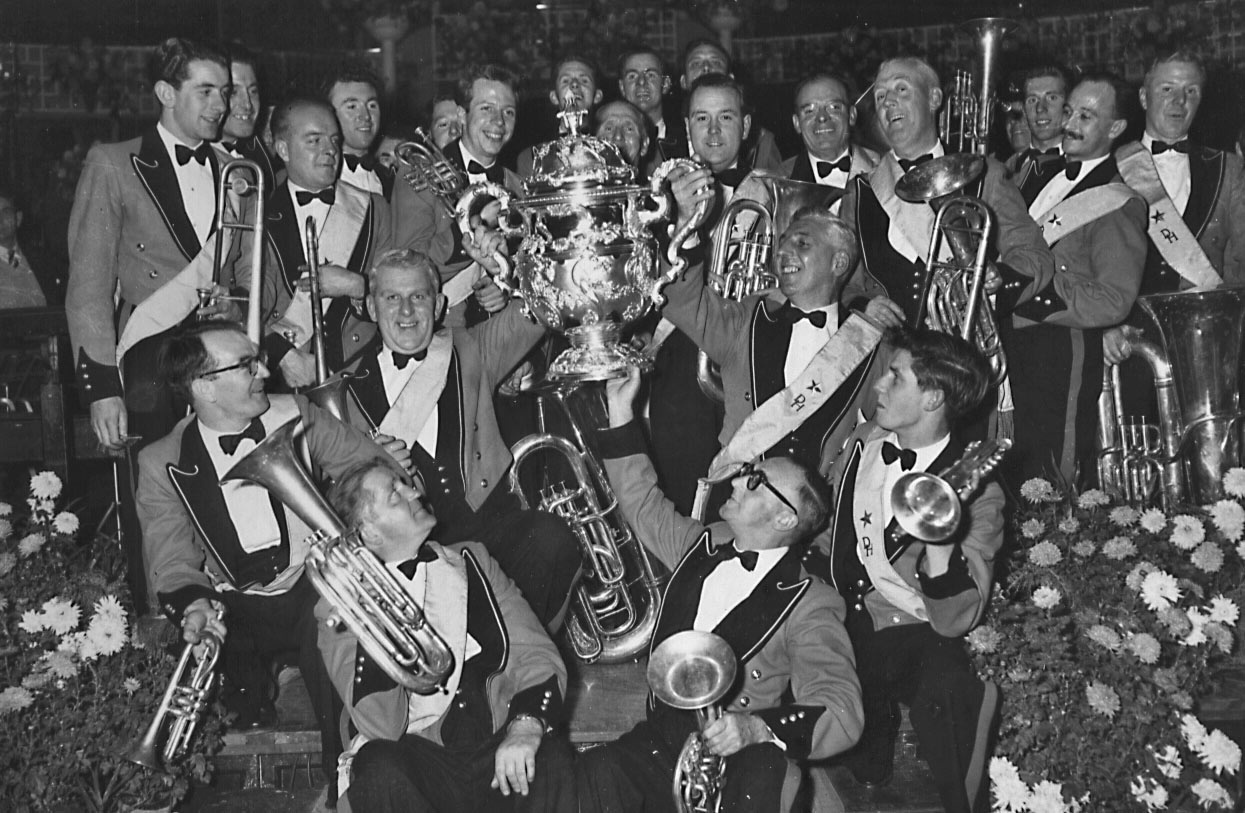
Major Championship winner in 1956 (right at the back)
Championship winner
This was the period in which the Stockport band established their post war reputation as one of the leading major contest outfits - National Championship victories coming in 1952, 1954, 1956 and 1965; success at the British Open in 1950 (on an iconic performance of ‘Resurgam’), 1956, 1961-62-63 and again in 1965.
They were also North West Are champions four times between 1951 and 1963 and made numerous radio broadcasts and LP recordings.
That 1950 Belle Vue ‘Resurgam’ saw Norman lead a cornet section that was later described by Bram Gay as “the greatest that God ever put together in one band” - the head of a ‘front-row’ of the New Zealander Ken Smith, Leonard Lamb and Harry Stanway.
Gay ranked Ashcroft as “one of the great leaders of a band”, whilst Les Beevers described him as “absolutely brilliant”. Others such as Jim Shepherd called him “a superb player” as did Ken Dennison who called him “an absolute world beater”.
Gay ranked Ashcroft as “one of the great leaders of a band”, whilst Les Beevers described him as “absolutely brilliant”. Others such as Jim Shepherd called him “a superb player” as did Ken Dennison who called him “an absolute world beater”
Play them all
As Dennison also pointed out though, perhaps because of his unassuming personality the solo spotlight wasn’t for him (even at his peak he was happy allowing Ken Smith to play the stand up solos in concerts).
Recordings of showcase solos are rarities, although as Phillip McCann who, instigated by Ashcroft himself, took over from him at Fairey, said, “...he could play them all without a doubt”.
He found just as much enjoyment hearing others perform, especially those he quietly mentored through subtle inference and advice in the bandroom or at his home near to the Fairey bandroom.
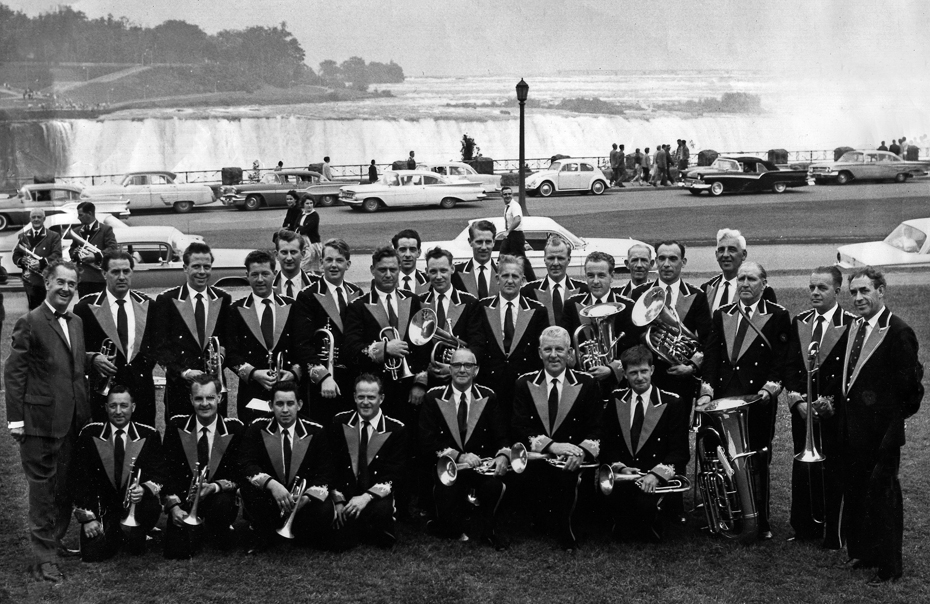
With Harry Mortimer at Niagara Falls (2nd left of front row)
Always supportive
As Phillip McCann told 4BR; “He was always singing and he was such a musical player. What stood out though was his personality - warm, quiet and always supportive. He offered his advice when appropriate, never dictated it.
He pointed me towards solos such as ‘Fairies of the Water’, but could play it so beautifully himself.
There was no side to him – he was just as happy sitting on the end chair as he was further down the line in later years. That was the mark of a true leader in a brass band.”
Generations of players benefitted from his quietly imparted, sage advice. In 1951 he was invited to become a tutor on the National Youth Brass Band of Great Britain, enjoying the opportunity to impart his knowledge (usually with a dry wit) to youngsters.
There was no side to him – he was just as happy sitting on the end chair as he was further down the line in later years. That was the mark of a true leader in a brass band.
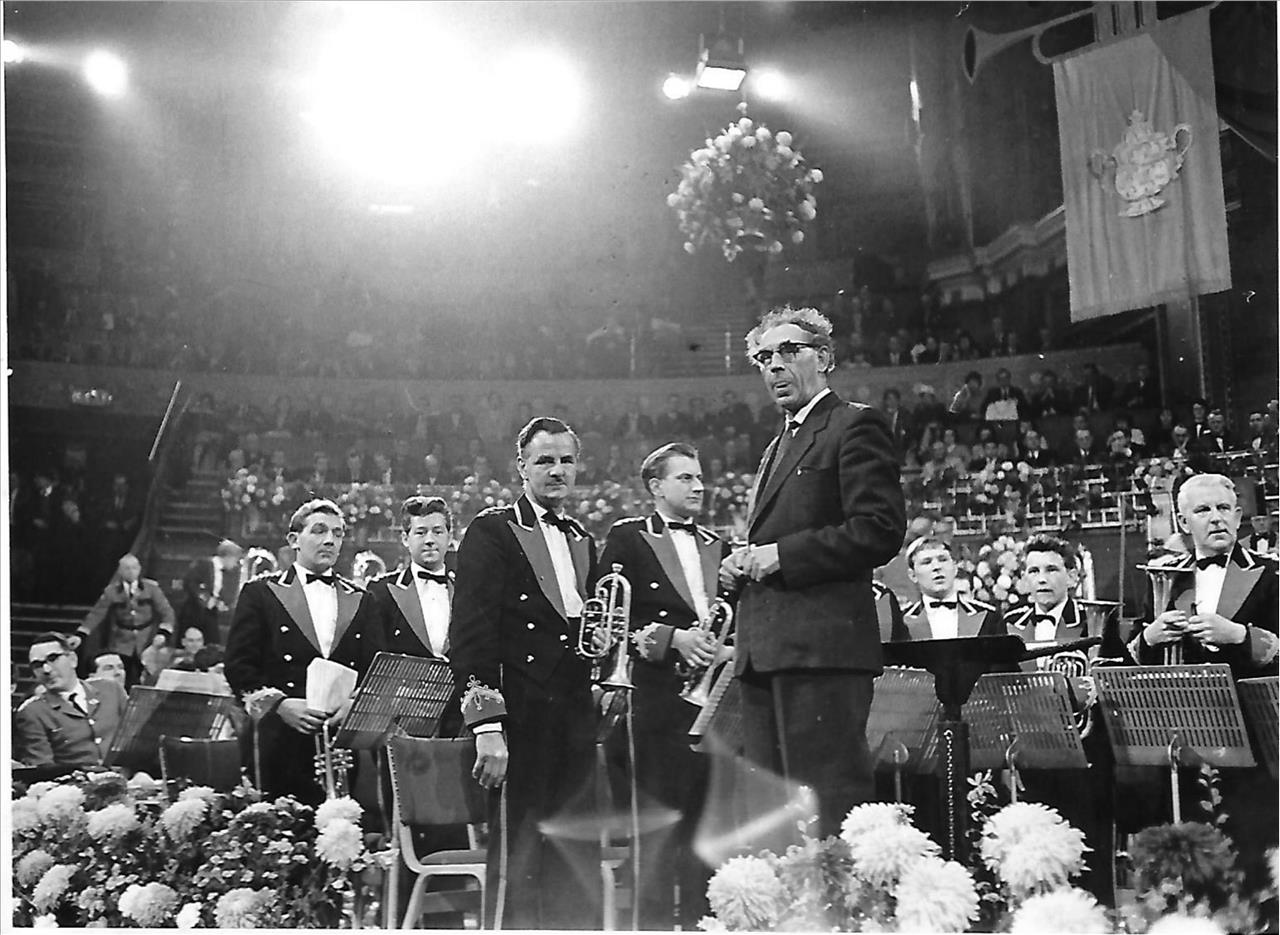
On stage at the Royal Albert Hall conducted by Leonard Lamb
In 1959 he took on the role as conductor of Mirrlees Works Band from Stockport - leading them from the Third to the Championship Section, winning the Senior Cup in 1963 and appearing at the National Final in 1967 on ‘Journey into Freedom’.
Later he led the Rochdale Band to Championship Section status, winning the Edinburgh International Contest in 1977 and just missing out on winning the Grand Shield in 1977 and 1978. He enjoyed further success with Tintwistle, winning the Pontins Third Section title in 1980.
Highest rank
It will however be as a player in the highest rank of principal cornets that he will be best remembered; subtle and refined, his confidence steely and self imposed. The extravagant gestures he left for others.
He once described himself as “an alright kind of player.” It was some understatement of the truth – especially other people’s opinions of him.
He once described himself as “an alright kind of player.” It was some understatement of the truth – especially other people’s opinions of him.
In 1972 he was awarded the Insignia of Honour at the National Brass Band Championships in the Royal Albert Hall, where his ‘working and singular contribution’ to the banding movement was acknowledged.
The citation read: “In paying tribute to him today, we recognise our dependence on men of his ability, integrity and dedication.”
Norman Ashcroft passed away on Monday, 6th July, in hospital at Llandudno, North Wales, in his 90th year.
Tim Mutum
4BR Hall of Fame: No.1: Jack Atherton
https://www.4barsrest.com/articles/2019/1832.asp
4BR Hall of Fame: No.2: Albert Baile
https://www.4barsrest.com/articles/2019/1836.asp
4BR Hall of Fame: No.3: Stanley Boddington
https://www.4barsrest.com/articles/2019/1842.asp
4BR Hall of Fame: No.4: Bram Gay
https://www.4barsrest.com/articles/2020/1848.asp
4BR Hall of Fame: No.5: Leonard Lamb
https://www.4barsrest.com/articles/2020/1855.asp
4BR Hall of Fame: No.6: Arthur Stender
https://www.4barsrest.com/articles/2020/1866.asp
4BR Hall of Fame: No.7: Violet Brand
https://www.4barsrest.com/articles/2020/1871.asp
4BR Hall of Fame: No.8: Eric Bravington
https://www.4barsrest.com/articles/2020/1875.asp



